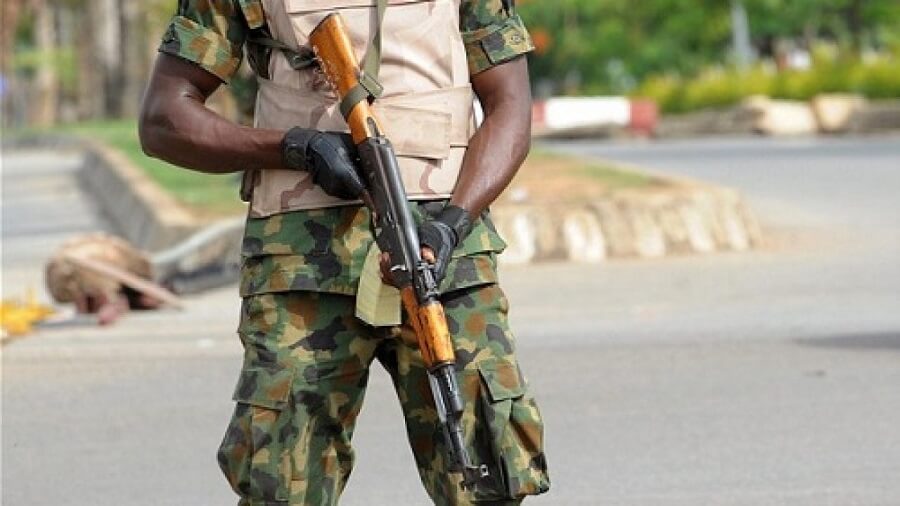ANALYSIS: Soldier’s Account Of Terrorists’ Ambush On Guards Brigade Reveals Disturbing Lack Of Professionalism
Early Sunday morning, three units of the Nigeria Army on the trail of terrorists around the forest surrounding the Veritas University campus in Bwari were ambushed, leading to a firefight and casualties on both sides.
A statement released on Monday by the Presidential Guards of Brigade, claimed that three soldiers were injured during the clash, while media reports confirmed that two officers and a soldier paid the supreme price during active service to the fatherland.
Advertisement
On Thursday, the Defence Headquarters said military troops have eliminated 30 of the terrorists who attacked the troops of the Guards Brigade. Defence Spokesman, Major-General Bernard Onyeuko, made this known at the bi-weekly news conference on military operations in Abuja.
He said a combination of land and air troops successfully cleared Kawu and Ido villages, neutralised the terrorists, and destroyed their enclave and hide out, while also recovering six motorcycles, two AK47 rifles, one fully loaded LMG magazine amongst others during mop-up.
But one of the soldiers who survived the Sunday ambush, and now recuperating, sent a voice message from his hospital bed where he narrated how the clash happened. His account of the tragedy puts to question the level of professionalism exhibited by the leader of the team.
THE WHISTLER listened to the voice note and engaged a retired senior army officer to analyse the content with a view to determining the level of professionalism displayed by the military team.
Advertisement
The officer confirmed that the voice note is that of a soldier who was part of the team that engaged the terrorists because of his language.
Excerpts from his analysis of the soldier’s voice note: “They started well, but when they now got to an obstacle that hindered their progression without their supportive weapon, they made a mistake by making unnecessary assumptions. Since they knew it was a hilly area and an undulating area where mobility is difficult, they should have expected that the enemies would sight them first before they would sight them.
“As soon as they got to that point where the movement became impossible, they should have asked for air support or ask for another ground support so that they can maneuver through the back to encircle the enemies, which they later did after suffering casualties.
“The training is that if you’re going to go against your enemy if you’re three, you should go with 10 men so that they cannot subdue you. The officer that led the team was the one that made the mistake. He shouldn’t have assumed. The assumption was wrong.
‘The soldier that narrated the story was truly involved, he didn’t make it up. Based on his comments, that assumption cost them dearly.
Advertisement
‘They’re supposed to have a drone, UAV (Unmanned Area Vehicle) that scout round, which could have helped them to survey the surrounding and get the location of the terrorists. But we know it’s not easy to purchase those things now.
‘Which country will release that equipment to you? We cannot use those ordinary drones which terrorists can easily bring down. We need the combat drone that will go up in the sky and give you information on their location and number. That one, even if they fire at it they cannot get to it. There are many other military equipment that we are supposed to have but do not have.
‘The one we have is being used in the North East and it’s not something we can easily purchase because of our budgeting process and the processes it would follow in the countries where we can purchase them. These are equipment we should have had in our arsenal long time ago. We are supposed to be upgrading our equipment every year.
‘But because of fear of a military coup, many of this equipment was not purchased. Some of the equipment we’re getting today were not in our shelf before. The fear that if the military have all the arsenal they need at their disposal, they could use it to easily overthrow governments.
‘We need to have a powerful surveillance system and intensify land and air patrol.
‘Our DSS too are not helping matters, unfortunately. They don’t give enough information. I’m using my own experience. In each local government you have detachments of DSS. From there they can dispatch to volatile areas. But what obtains now is that the DSS will expect you , that is supposed to execute the information they have, to give them information. If the military wants to go on patrol, the DSS will want to go with you!”



